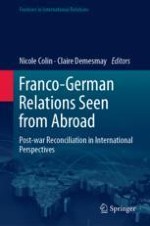2021 | OriginalPaper | Buchkapitel
An Inspiring and Intimidating Relationship: Franco-German Cooperation from the Polish Perspective
verfasst von : Kornelia Kończal
Erschienen in: Franco-German Relations Seen from Abroad
Aktivieren Sie unsere intelligente Suche, um passende Fachinhalte oder Patente zu finden.
Wählen Sie Textabschnitte aus um mit Künstlicher Intelligenz passenden Patente zu finden. powered by
Markieren Sie Textabschnitte, um KI-gestützt weitere passende Inhalte zu finden. powered by
